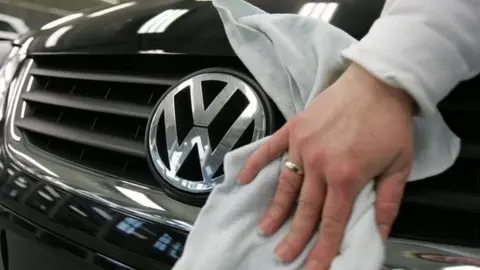VW and Daimler face cartel accusations
 AFP/Getty Images
AFP/Getty ImagesSupervisory boards at two big German carmakers are to hold emergency meetings later after they were accused of breaching EU cartel rules.
Volkswagen and Daimler have declined to comment on the allegations that they and other German car giants colluded to fix the price of diesel emissions treatment systems.
The claims first surfaced on Friday in a report by Der Spiegel magazine.
The issue is under investigation by EU and German anti-trust regulators.
Companies found to have infringed EU cartel rules are liable to pay fines of up to 10% of their global revenue.
Other firms under investigation are BMW, Porsche and Audi.
Profit rise
Speaking to journalists, Daimler chief executive Dieter Zetsche declined to comment on the allegations, noting that the European Commission had not begun formal proceedings against his company.
"We are well advised not to take part in speculation," he said, but added: "The automotive industry is currently making headlines, and not good ones."
Mr Zetsche was speaking after Daimler announced its second-quarter results, which showed a rise in operating profit of 15% to 3.74bn euros (£3.34bn).
The German car industry is also dealing with the fallout from the 2015 diesel car emission-rigging scandal, which erupted after Volkswagen was found to have cheated official tests by using special software to produce artificially low pollution levels.
VW, the world's largest car manufacturer, has admitted about 11 million cars worldwide were fitted with the device.
Last year, a US court ordered VW to pay a $14.7bn (£12bn) settlement over the scandal.

Analysis: Joe Miller, European business reporter
Once, they were the jewels in the crown of German industry, proud symbols of the country's unrivalled engineering and manufacturing expertise.
Now, carmakers such as Volkswagen and Daimler are more of a national embarrassment, with a seemingly endless stream of revelations muddying the "Made in Germany" brand.
The public scrutiny of German automakers may have started in 2015, when Volkswagen was found to have cheated on diesel emission tests. But now, allegations published in Der Spiegel point to collusion on diesel technology dating back to the 1990s, and involving most of the other large car brands.
None of this will help German carmakers in their fight against potential bans on diesel vehicles in some of the country's largest cities, such as Munich and Stuttgart.
The German government, the EU, and indeed the general public, are losing patience. The carmakers need a PR win, and quickly.
Whatever the outcome of Wednesday's board meetings, expect the carmakers to try and move the agenda on to new electric vehicles and futuristic autonomous technology.
